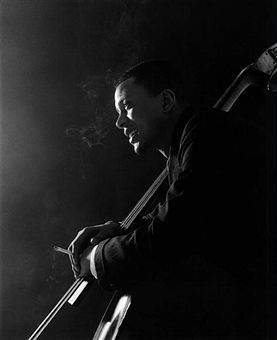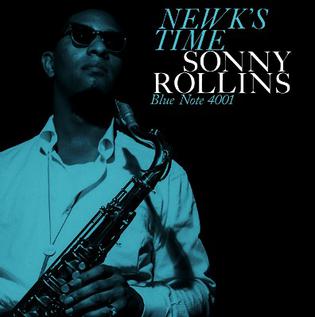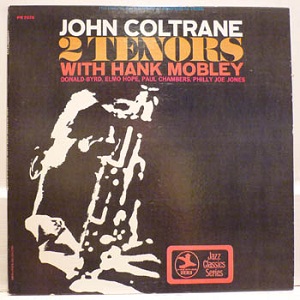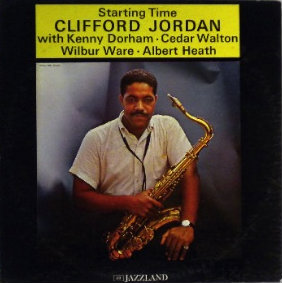
Henry "Hank" Mobley was an American tenor saxophonist and composer. Mobley was described by Leonard Feather as the "middleweight champion of the tenor saxophone", a metaphor used to describe his tone, that was neither as aggressive as John Coltrane nor as mellow as Lester Young, and his style that was laid-back, subtle and melodic, especially in contrast with players such as Coltrane and Sonny Rollins. The critic Stacia Proefrock claimed him "one of the most underrated musicians of the bop era." Mobley's compositions include "Double Exposure", "Soul Station", and "Dig Dis".

McKinley Howard "Kenny" Dorham was an American jazz trumpeter, composer, and occasional singer. Dorham's talent is frequently lauded by critics and other musicians, but he never received the kind of attention or public recognition from the jazz establishment that many of his peers did. For this reason, writer Gary Giddins said that Dorham's name has become "virtually synonymous with 'underrated'."

Douglas Watkins was an American jazz double bassist. He was best known for being an accompanist to various hard bop artists in the Detroit area, including Donald Byrd and Jackie McLean.

Someday My Prince Will Come is the seventh studio album by Miles Davis for Columbia Records, catalogue CL 1656 and CS 8456 in stereo, released in 1961. Recorded at Columbia's 30th Street Studio in Manhattan, New York City, it marked the only Miles Davis Quintet studio recording session to feature saxophonist Hank Mobley.

Soul Station is an album by American jazz saxophonist Hank Mobley recorded on February 7, 1960 and released on Blue Note later that year. Mobley's quartet features rhythm section Wynton Kelly, Paul Chambers and Art Blakey.

At the Cafe Bohemia, Vols. 1 & 2 are a pair of separate but related live albums by the Jazz Messengers recorded at the Café Bohemia jazz club in Greenwich Village on November 23, 1955 and released on Blue Note in April 1956.

Trane's Blues is a compact disc credited to the jazz musician John Coltrane, released in 1999 on Blue Note Records, catalogue 98240. It comprises recordings from sessions for Blue Note and United Artists Records with Coltrane as a sideman for Paul Chambers, Sonny Clark, Johnny Griffin, and Cecil Taylor. These recordings were issued respectively on their Whims of Chambers, Sonny's Crib, A Blowin' Session, and Hard Driving Jazz albums. Two selections are from Coltrane's own 1957 Blue Train, and "One for Four" had been previously unissued. "Trane's Blues" had been issued on the compilation High Step in 1975, previously known as "John Paul Jones" and named after himself, the bass player Chambers, and the drummer Philly Joe Jones. Like Prestige Records before them, as Coltrane's fame grew long after he had stopped recording for the label, Blue Note used varied recordings, often those where Coltrane had been merely a sideman, and reissued them as a new album with Coltrane's name prominently displayed. In this case, the Big Four conglomerate EMI continued that earlier practice.

Page One is the debut album by American jazz tenor saxophonist Joe Henderson, recorded and released by Blue Note Records in 1963. Henderson is featured in a group with trumpeter Kenny Dorham, pianist McCoy Tyner, bassist Butch Warren and drummer Pete La Roca. The pieces on the album were written by either Henderson or Dorham, and include two pieces that went on to become jazz standards: Henderson’s "Recorda Me" and Dorham’s "Blue Bossa". All of the musicians are listed on the album's front cover with the exception of Tyner, who is credited as "ETC." due to his being signed to rival Impulse! Records.

Newk's Time is an album by American jazz saxophonist Sonny Rollins recorded on September 22, 1957 and released on Blue Note in 1959—his third album for the label.

Workout is an album by jazz tenor saxophonist Hank Mobley released on the Blue Note label in 1962. It features performances by Mobley, pianist Wynton Kelly, bassist Paul Chambers, guitarist Grant Green, and drummer Philly Joe Jones. The album was identified by Scott Yanow in his Allmusic essay "Hard Bop" as one of 17 Essential Hard Bop Recordings. In October 2014, it was released in Japan on SHM-CD, featuring a previously unissued take of "Three Coins in the Fountain".

Horace Silver and the Jazz Messengers is an album by Horace Silver and the Jazz Messengers compiling two 1955 10" LPs—Horace Silver Quintet, Vol. 3 and Horace Silver Quintet, Vol. 4 —recorded on November 13, 1954 and February 6, 1955 respectively and released on Blue Note in October 1956—Silver’s debut 12". The quintet features horn section Hank Mobley and Kenny Dorham and rhythm section Doug Watkins and Art Blakey.

The Turnaround! is an album by jazz tenor saxophonist Hank Mobley recorded on March 7, 1963 and on February 4, 1965. It was released in 1965 by Blue Note Records. It features performances by Mobley with trumpeter Donald Byrd, pianist Herbie Hancock, bassist Butch Warren and drummer Philly Joe Jones from the earlier session and trumpeter Freddie Hubbard, pianist Barry Harris, bassist Paul Chambers and drummer Billy Higgins from the latter.

Goin' Up is an album by trumpeter Freddie Hubbard released on the Blue Note label in 1961. It features performances by Hubbard, Hank Mobley, McCoy Tyner, Paul Chambers and Philly Joe Jones.

Blue Spring is a 1959 album by jazz trumpeter Kenny Dorham and saxophonist Cannonball Adderley released on the Riverside label, featuring performances by Dorham and Adderley with Dave Amram, Cecil Payne, Cedar Walton, Paul Chambers, and Philly Joe Jones or Jimmy Cobb.

Afro-Cuban is an album by American jazz trumpeter Kenny Dorham, recorded for Blue Note on March 29, 1955 and released later that year on the Blue Note Modern Jazz Series, shortly before the label discontinued the format. It was soon reissued on the new 1500 series, recompiled with a session by an early incarnation of the ensemble, with new cover art.

The Complete Blue Note Hank Mobley Fifties Sessions is limited edition box set that was released by Mosaic Records in 1998. Included are Mobley's recordings for Blue Note in the late 1950s from the albums The Hank Mobley Quartet, Hank Mobley Sextet, Hank Mobley & His All-Stars, Hank Mobley Quintet, Hank, Hank Mobley, Curtain Call, Peckin' Time and Poppin' . The albums were recorded with Art Blakey, Donald Byrd, Paul Chambers, Sonny Clark, Kenny Dorham, Art Farmer, Bill Hardman, Milt Jackson, Philly Joe Jones, Wynton Kelly, Lee Morgan, Charlie Persip, Jimmy Rowser, Horace Silver, Art Taylor, Bobby Timmons, Wilbur Ware, and Doug Watkins.

Two Tenors is an album credited to jazz musicians John Coltrane and Hank Mobley, released in 1969 on Prestige Records, catalogue 7670. It is a reissue of Prestige 7043 Informal Jazz by Elmo Hope, released in 1956. As Coltrane's fame grew during the 1960s long after he had stopped recording for the label, Prestige assembled varied recordings, often those where Coltrane had been merely a sideman, and reissued them as a new album with Coltrane's name prominently displayed. In this case, by 1969 Hope had become a far less marketable figure than Coltrane and Mobley, hence the redesignation of the LP.
John Erskine "Rocky" Boyd is an American jazz saxophonist.

Farmer's Market is an album by trumpeter Art Farmer, featuring performances recorded in 1956 and released on the New Jazz label.

Starting Time is an album by jazz saxophonist Clifford Jordan which was recorded in 1961 and released on the Jazzland label.



















